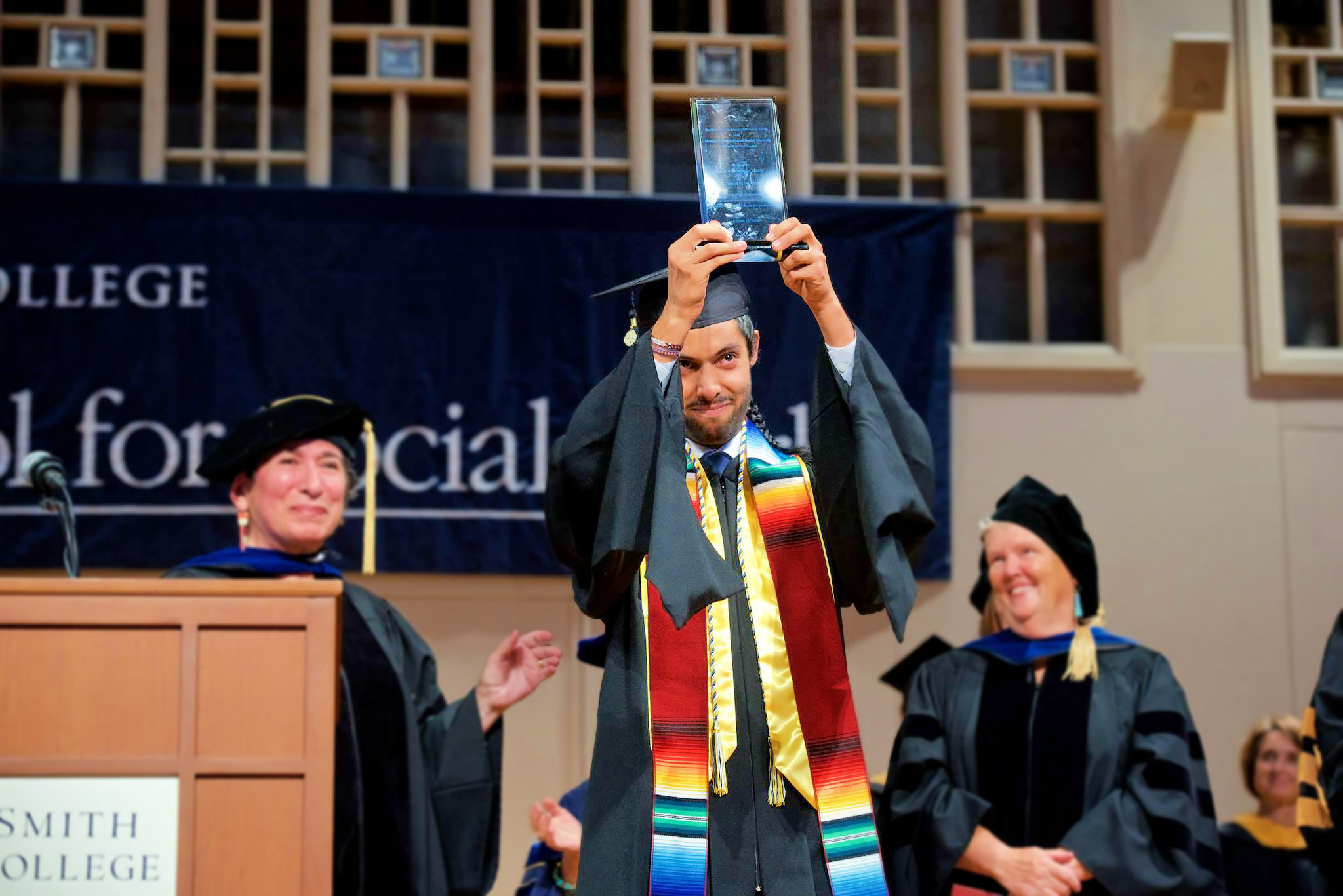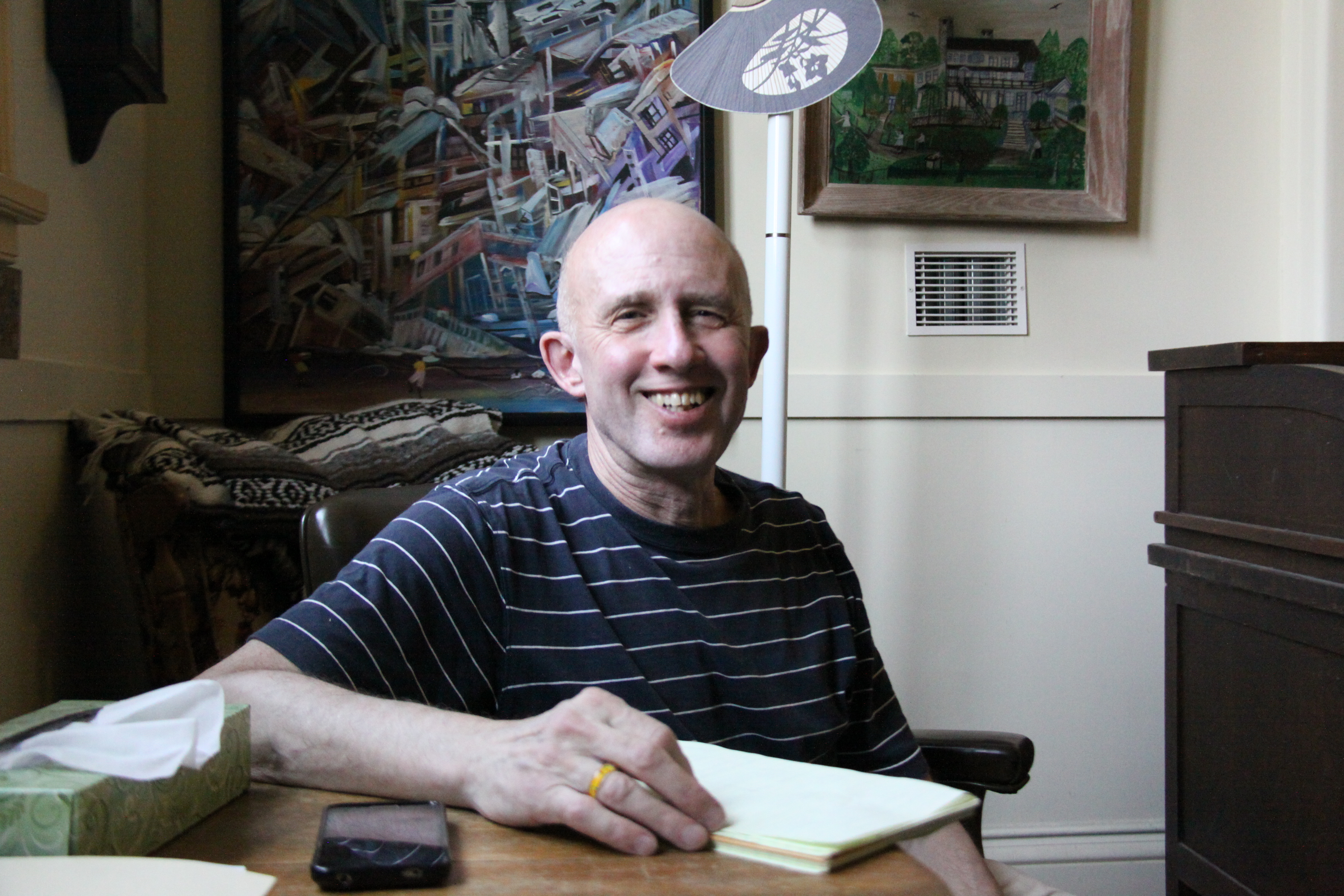
During this year’s August commencement, student Manuel Ortiz teared up as he received the “student of the year” award, partly for his activism against what he and other students call institutional racism at Smith's School for Social Work. (Courtesy of Smith College)
For the past few years, graduate students at Smith's School for Social Work have been protesting what they see as institutional racism within the program. They claim students of color disproportionately face academic probation and don’t get enough support when faced with racism on and off campus.
“These issues are very real to us and for a really long time have been swept under the rug,” said Manuel Ortiz, a student activist who has led protests on the Smith campus.
To address those issues, students presented administrators a list of demands in July, including making changes to the curriculum to assign more readings from black and Latino scholars.
"The school has had an anti-racism commitment for over 20 years, and part of that commitment is not only to identify issues of racism, but also to intervene around issues of racism,” Ortiz said, sitting in Smith's student center.
In July, administrators did intervene, issuing an action plan that included creating additional support for students with “marginalized identities,” and allowing students under academic review to have an advocate who can "raise the visibility of the ways that racism and social oppression may be at work."
School for Social Work Dean Marianne Yoshioka signed off on the plan.
“Higher education is much more of a collaborative learning process. Who gets to say how that agenda’s gonna get built? Who gets to say how that classroom process is learning? And that is not something that is answerable by me by coming down top down,” Yoshika said.
That bottom-up approach, though, has disturbed some longtime faculty at Smith. Two weeks after the changes were adopted, one of the school's department chairs, Dennis Miehls, sent a letter to Dean Yoshioka, expressing frustration that the accusations of racism have gotten out of hand.
"The core of the problem is that the admissions process of our School has been tainted. For a number of years, we have admitted students who did not have a a reasonable chance of success in our program," Miehls wrote. "Why do you, as administrators, continue to offer differential outcomes to students of color?"
A second letter by anonymous adjunct faculty expressed similar concerns.
The letters were leaked to students, and Manuel Ortiz says the language only reinforces students' concerns.
"When you’re referring to students of color and you’re saying that us coming into this program is tainting this program - that is inherently racist," Ortiz said. "That’s a racist statement to make.”
Miehls didn't respond to our requests for comment. But his colleagues tell us that the letters reflect an active debate behind closed doors.

Joshua Miller is a professor and Associate Dean at the School for Social Work. (Kirk Carapezza/WGBH)
Earlier: How Should Colleges Acknowledge And Memorialize Their Ties To Slavery?
"Some of the themes in the letters have certainly been part of faculty discussions, disagreements, discourses," said Professor Josh Miller, who teaches courses on racism at the School for Social Work.
Miller dismisses the idea that student activism has become so strident that it's undermining the school's educational mission.
“Students are rightfully upset at the lack of progress in many significant areas here," Miller said. "So does that mean that the students are entitled? No. Overall I think that the students are actually holding us accountable and inviting us to live up to the standards that we say we want to aspire to."
But the two letters are clear: some faculty believe administrators have ceded control to students at the expense of academic rigor.
And in public, administrators appear to be siding with students.
At last month's summer graduation, administrators named Manuel Ortiz student of the year, in part, for his activism.
When he accepted the award, tears welled in his eyes.
"Something needed to change in this program, and something is changing in this program,” he told his classmates.
Speaking days after the letters became public, Dean Yoshioka reassured graduates that they had earned place at Smith.
"You were always the students that we wanted and you are the alumni that we are proud to claim," she said, responding indirectly to the leaked letters. "You are among the most competent and capable."
Since then, students have made additional demands, including that Professor Miehls stop advising students and take sensitivity training.
There's still no word whether administrators plan to meet those demands.
Lydia Emmanouilidou contributed to this report.
Earlier: Are College Administrators Stifling Free Speech On Campus?










